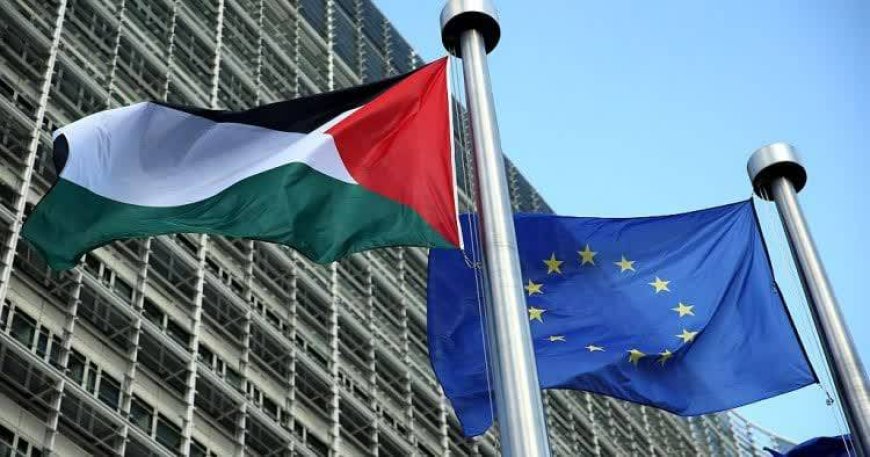The Time is Now: Why the European Union Must Recognize an Independent Palestinian State?

Exceeding 31,000 civilians, there has been a tragic surge in the number of Palestinian casualties since the outbreak of Israeli aggression against the besieged Gaza Strip on October 7, raising global awareness about the ongoing plight in Gaza. In the meantime, European governments are well aware that, in the face of public pressure, they are compelled to take steps to assuage such pressures. Against this backdrop, there is a discernible trend in Europe towards seeking pragmatic, or, to put it another way, proactive, diplomatic initiatives concerning the Palestinian predicament in response to mounting domestic pressures.
The crucial question arises: why is the recognition of Palestine as an independent and sovereign state of paramount importance? As Israeli-Palestinian tensions soar to unprecedented heights since the inception of Israel in 1948, the key to ensuring enduring peace and security for both parties lies in guaranteeing Palestinian rights to self-determination. However, mere recognition alone will not suffice to reinvigorate the so-called Israeli-Palestinian peace talks conducive to Palestinian sovereignty. It necessitates concerted efforts to challenge Israel's annexation of Palestinian territories and foster the emergence of a credible Palestinian leadership capable of garnering public support for negotiations to resolve the protracted conflict with the Zionist regime.
To date, 139 countries, including nine EU member states (the most recent being Sweden in 2014), have extended recognition to Palestine. Conversely, countries like France, Germany, Italy, Norway, and the United Kingdom have refrained from doing so, citing concerns that such a move could undermine the Oslo process. Conditioning Palestinian self-determination on a flawed political framework has perpetually been an erroneous approach that Europe appears steadfast in upholding, despite purported intentions to reform and enhance it.
Recent declarations of support for recognizing a Palestinian state prior to a conclusive Israeli-Palestinian peace agreement by the UK and select EU member states mark a notable departure from past stances. The United States is purportedly contemplating a similar course of action as part of a broader regional arrangement aimed at securing Saudi Arabia's acquiescence to a historic normalization accord with Israel ahead of the upcoming U.S. presidential election in November.
Meanwhile, Riyadh has conveyed to Washington its stance that diplomatic ties with Israel cannot be feasible until an independent Palestinian state is acknowledged within the 1967 borders, with East Jerusalem as its capital, and Israel ceases hostilities in Gaza. Other pivotal Arab nations, such as Egypt, have linked their support for post-conflict reconstruction in Gaza to international efforts advocating for a Palestinian state.
While this policy shift is a significant, albeit belated, development, conferring recognition solely upon a singular Palestinian state would predominantly hold symbolic value and offer scant progress towards establishing a two-state solution aligned with international norms. The absence of explicit territorial delineations risks lending credence to the notion of a Palestinian "minus state," as envisioned by Donald Trump, exacerbating tensions and perpetuating conflict in Palestine.
For recognition to constitute a substantive stride towards enduring peace in West Asia, it must be coupled with an end to Israel's occupation of Palestinian territories. Consequently, Western governments should prioritize urging the Israeli regime, both in policy and public sentiment, towards terminating this occupation in accordance with and endorsing the establishment of a Palestinian state.
The European Union has decried Israel's settlement policies as entrenching a "one-state reality characterized by unequal rights, enduring occupation, and conflict," a characterization increasingly echoed by human rights organizations as an "apartheid regime." This Israeli approach represents a contentious and counterproductive stance that perennially undermines peace-building and dialogue efforts.
To command credibility with public opinion, European nations must undertake tangible measures to challenge Israel's unlawful settlement ventures in occupied Palestinian territories. Collaborating and endorsing sanctions akin to those recently imposed by the United States, Britain, and France against violent Israeli settlers is imperative. European governments should unequivocally support ongoing inquiries by the International Criminal Court (ICC) and the International Court of Justice (ICJ) and intensify condemnations of Zionist settlements.
Israel's far-right administration, staunchly opposed to a two-state resolution, is poised to rebuff such diplomatic overtures as capitulating to Hamas. This quasi-fascist administration is inclined to legitimize its war crimes through the dissemination of misleading information to achieve its expansionist aims, culminating in the complete annexation of Palestinian territories.
Amidst a backdrop of deteriorating political and security conditions in the Middle East, European states must wield the "recognition card" before the prospects of a two-state solution are irrevocably dashed. By exerting amplified pressure on the Israeli regime, they can avert a cataclysmic escalation of violence, which can potentially spill over to western borders. Europe appears cognizant of this escalating crisis, as evidenced by the endeavors of Spain, Malta, and Ireland in this vein. Furthermore, recent declarations by Paris signal a departure from the erstwhile taboo concerning the recognition of an independent Palestinian state, underscoring its imperative amidst the ongoing massacres in Gaza. Hence, in response to the exigencies of public opinion and regional developments, European governments are compelled to jettison their cautious approach and decisively confront Israel to forestall heightened tensions and violence in the region. Failure to curb this cycle of animosity and brutality would undoubtedly ensnare Europe as a casualty in its wake.













































